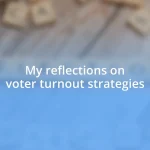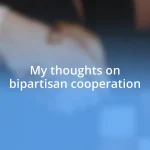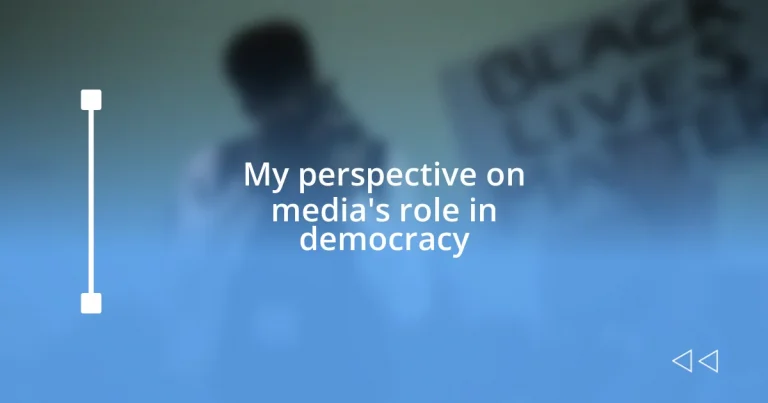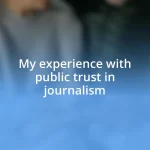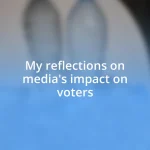Key takeaways:
- Media is essential in democracy for informing citizens, holding power accountable, and fostering public discourse.
- The historical evolution of media—from print to television to the internet—has shaped public opinion and engagement in democracy.
- Diverse representation in media enhances understanding, combats stereotypes, and encourages civic engagement among various communities.

Understanding media’s importance in democracy
Media serves as the backbone of democracy by providing citizens with essential information that allows them to make informed decisions. I remember the excitement I felt during an election season when news outlets discussed candidate platforms and current issues; it felt empowering to engage in conversations with my friends, armed with the knowledge I’d gained. Isn’t it amazing how access to diverse perspectives can shape our understanding of complex societal problems?
Moreover, media acts as a watchdog, holding power to account. I once witnessed a local news investigation that exposed corruption within my city council, stirring a community response and prompting action. When we recognize that the press can influence change, it becomes clear that an active, investigative media is crucial for preserving our democratic values. Can you imagine a world where such accountability doesn’t exist?
Finally, the role of media in fostering public discourse cannot be understated. Social media platforms have created spaces for dialogue and debate, although they also come with their own challenges. I often find myself in heated discussions online, reflecting on how varied opinions enrich our democratic fabric. How does your engagement with media shape your viewpoints and influence your participation in democracy?
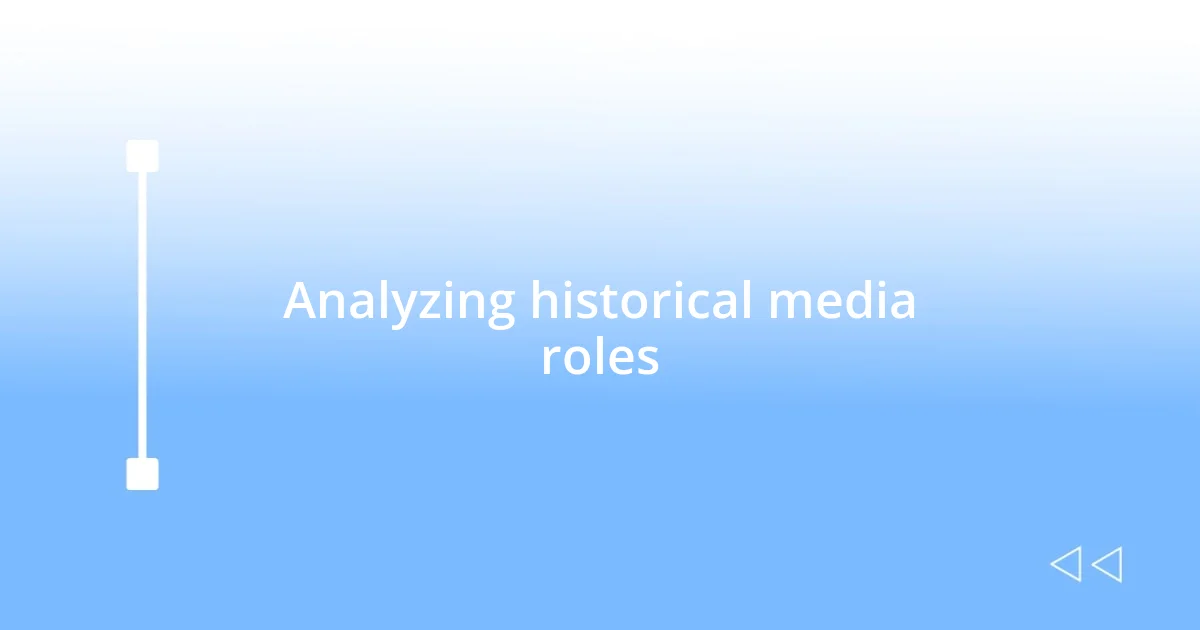
Analyzing historical media roles
Media has played various roles throughout history, adapting to the needs of society and the dynamics of political power. In the early 20th century, newspapers served as critical platforms for political debate during pivotal moments, like the suffrage movement. I recall reading about how passionate journalists fought for women’s rights, sparking my admiration for the courage it took to pursue truth in the face of adversity. Isn’t it inspiring to think how the press has historically propelled social change?
As we progressed into the television era, media shifted from print to audiovisual storytelling, shaping public opinion on a grand scale. I remember watching the Watergate hearings unfold on TV, captivated by the drama and the implications for democracy. It felt like the spotlight was on accountability, making me realize how influential media can be in swaying the public’s perceptions. Have you ever felt that thrill of learning something significant through a news broadcast?
The rise of the internet in the late 20th century transformed how we consume information, making it more accessible and instantaneous. I think about logging onto forums and finding diverse viewpoints that challenged my own beliefs, leading to profound discussions. While this democratization of information is powerful, it raises questions about misinformation and the responsibility of platforms to ensure that accurate information prevails. What has your experience been with the evolving landscape of media?
| Era | Key Role of Media |
|---|---|
| Early 20th century | Platform for political debate and social change |
| Television Era | Influencer of public opinion and accountability |
| Internet Age | Accessibility of information and diverse perspectives |
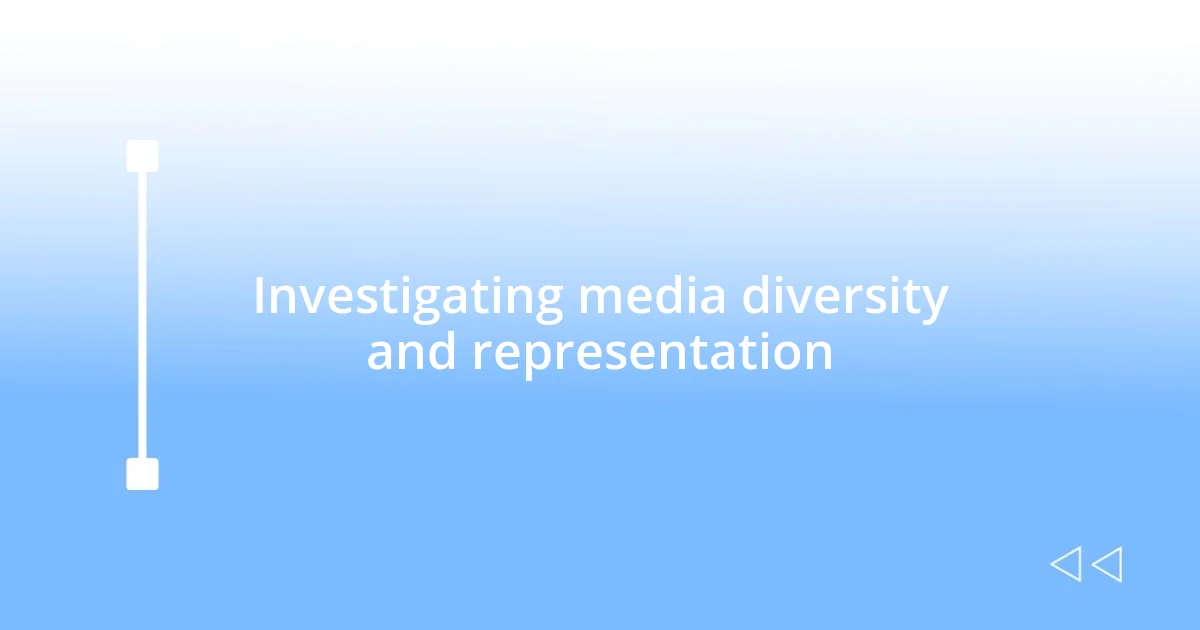
Investigating media diversity and representation
Media diversity and representation is vital for a truly democratic society. When I reflect on my media consumption, I can’t help but notice how different voices affect my perspective. For instance, listening to podcasts featuring marginalized communities often opens my eyes to experiences I may never encounter firsthand. It’s a reminder that representation isn’t just about numbers; it’s about amplifying voices that enrich our understanding of societal issues.
To grasp the importance of media diversity, consider these key points:
- Increased Understanding: Diverse media representation helps audiences grasp complex issues from multiple angles, fostering empathy.
- Civic Engagement: When people see themselves represented in the media, they are more likely to engage with democratic processes.
- Combatting Stereotypes: A varied media landscape challenges harmful stereotypes by showcasing the realities of different communities.
In my own experience, discovering authors and filmmakers from diverse backgrounds has led to profound insights and conversations among my friends. These narratives create bridges, transforming our understanding of each other’s worlds. Have you ever felt a story resonate so deeply that it changed your view on important topics?
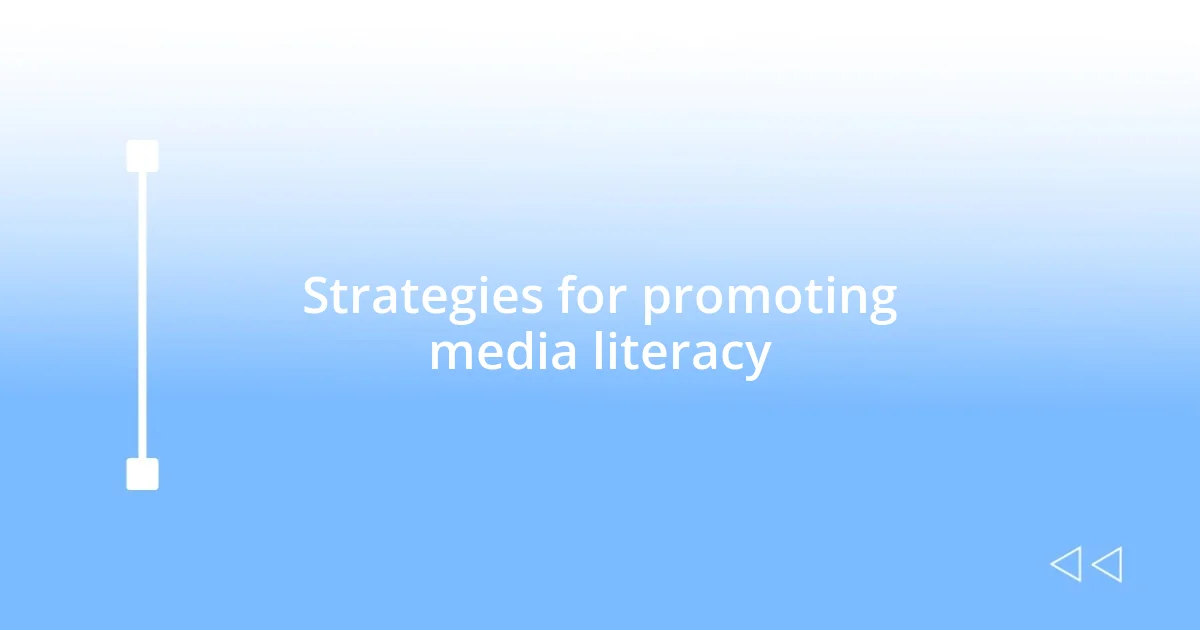
Strategies for promoting media literacy
To promote media literacy, one effective strategy is incorporating media education into school curriculums. I remember when we had a class project that required us to dissect a news article’s sources and biases. It truly opened my eyes to how easily information can be manipulated and the importance of critical thinking in assessing media. Shouldn’t we aim to cultivate this awareness early on in young minds to empower them as informed citizens?
Another powerful approach is utilizing community workshops that focus on practical skills. Hosting sessions where participants analyze current events or even social media trends can foster an environment for open discussion. I once attended a workshop that helped me identify fake news; the thrill I felt when I discerned misleading headlines was empowering. Isn’t it rewarding to equip ourselves and others with the skills to navigate today’s complex media landscape?
Finally, collaborating with local media organizations to promote accurate storytelling can have a strong communal impact. I’ve seen firsthand how partnerships can amplify diverse voices in my community, leading to more responsible reporting. When we support local journalism that prioritizes integrity, we strengthen our shared commitment to truth and accountability. How might your support for local media change the narrative in your community?
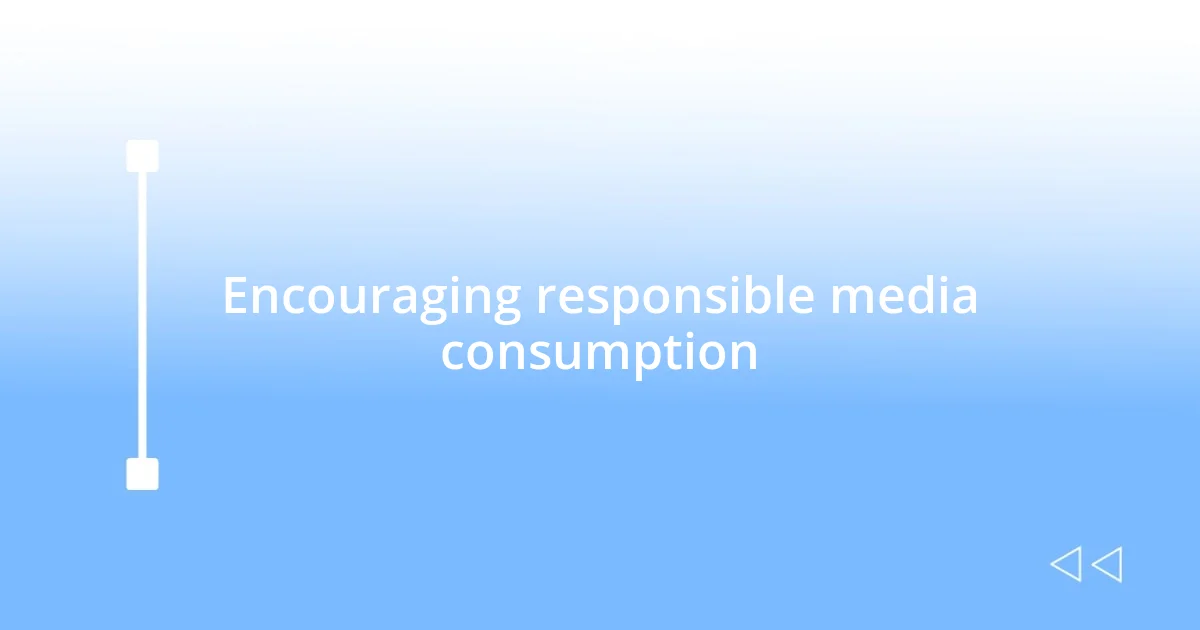
Encouraging responsible media consumption
Encouraging responsible media consumption is crucial in today’s information-saturated world. I often find myself reflecting on the content I engage with, realizing that not all media is created equal. For example, when I scroll through social media, I consciously choose to follow accounts that prioritize fact-based reporting and constructive dialogue. This small shift in my consumption habits has enriched my understanding and helped me separate sensationalism from genuine news. Have you taken a moment to evaluate the media you consume regularly?
Moreover, I think about the impact of discussing media content with friends and family. When we share articles or videos, I always encourage opening a dialogue about credibility and sources. Just the other day, a friend shared a viral article with me. Instead of taking it at face value, we spent a few minutes investigating its origins together. Sharing that experience not only made the media less daunting but also inspired us both to seek out more reliable sources. Have you ever turned a casual conversation into a learning moment about media?
It’s also essential to remember that our engagement goes beyond just consumption; it’s about advocacy for higher standards in media. I often participate in community discussions centered around the importance of ethical journalism. These conversations remind me that we all play a role in shaping the media landscape. If we can collectively advocate for responsible storytelling and demand transparency, won’t we pave the way for a more informed society? Making deliberate choices about what we support can truly lead to a media environment that reflects our democratic values.






